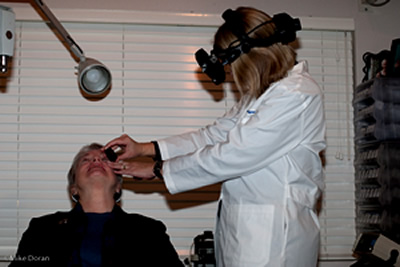 Your Eyes and Allergies
Your Eyes and Allergies
Your eyes can develop allergic reactions just like your body does. You may experience symptoms such as itching, burning and watering eyes. Here is a look at some of the most common ocular allergies and their symptoms.
Hay Fever or Dust Conjunctivitis
Conjunctivitis is an inflammation of the conjunctiva, the thin, transparent mucous membrane draped over the eye. Conjunctivitis is commonly called “pink eye.” Plant pollen, house dust and animal dander may trigger a reaction in sensitive eyes and people. The reaction usually starts a short time after your exposure, and may include tearing, itching and swelling. Your symptoms may be worse at the end of the day.
Giant Papillary Conjunctivitis
Contact lens wearers know this allergy more commonly as GPC. Among the things that may cause GPC are improper cleaning of contact lenses, infrequent contact lens replacement, and wearing contact lenses for too many hours. You have a greater risk of this allergy if you have asthma, hay fever or animal allergies. GPC may occur months or even years after you begin contact lens wear. GPC’s symptoms are itchy eyes after removing your lenses, mucus discharge in the morning, sensitivity to light and uncomfortable lenses. Your vision may blur due to deposits on the lenses or lens movement caused by tiny allergic bumps (papilla) on the inside of your upper eyelid.
Contact Dermatitis
Allergic contact dermatitis occurs when you come into contact with something that irritates your skin. Your eyelids and conjunctiva are very sensitive. Signs of this reaction include swelling, redness, scaly skin and blistering. Symptoms are itching and pain. The reaction usually develops about 12 to 72 hours after you are exposed.
Recommendations to Reduce Allergic Reactions
- Avoid exposure to allergen
- Rinse eyes with sterile saline solution
- Cold compresses – a couple of ice cubes in a clean washcloth
- Maintain contact lens integrity by replacing and cleaning the lenses as prescribe
- Reduce irritation with proper eyelid and eyelash hygiene
- Control ocular dryness with artificial tear drops, proper hydration and supplement
- Begin prescription allergy drops at the first signs of a reaction
- If you wear contact lenses, use your allergy drops before inserting your lenses or after you’ve removed them.
Dr. Griffith can help you manage your ocular allergies.
2 thoughts to “Your Eyes and Allergies”